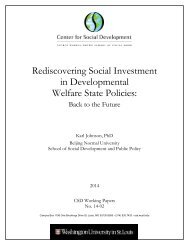Exploring and Assessing Intercultural Competence - Center for ...
Exploring and Assessing Intercultural Competence - Center for ...
Exploring and Assessing Intercultural Competence - Center for ...
Create successful ePaper yourself
Turn your PDF publications into a flip-book with our unique Google optimized e-Paper software.
which can be developed or modified through training <strong>and</strong> educational ef<strong>for</strong>ts? Commonly cited traits <strong>and</strong>/or<br />
characteristics of ICC include: flexibility, humor, patience, openness, interest, curiosity, empathy, tolerance<br />
<strong>for</strong> ambiguity, <strong>and</strong> suspending judgment, among others.<br />
Three Areas or Domains – ICC involves ability in three areas or domains (which, curiously, are just as<br />
important in one’s own native LC1 as well). These are:<br />
• the ability to establish <strong>and</strong> maintain relationships<br />
• the ability to communicate with minimal loss or distortion<br />
• the ability to collaborate in order to accomplish something of mutual interest or need.<br />
Four Dimensions – ICC also has four dimensions:<br />
• knowledge<br />
• (positive) attitudes/affect<br />
• skills, <strong>and</strong><br />
• awareness.<br />
Of these, awareness is central <strong>and</strong> especially critical to cross-cultural development. It is enhanced through<br />
reflection <strong>and</strong> introspection in which both the individual’s LC1 <strong>and</strong> the LC2 are contrasted <strong>and</strong> compared.<br />
Awareness differs from knowledge in that it is always about the “self” vis-à-vis all else in the world (other<br />
things, other people, other thoughts, etc.) <strong>and</strong> ultimately helps to clarify what is deepest <strong>and</strong> most relevant<br />
to one’s identity. Awareness is furthered through developments in knowledge, positive attitudes, <strong>and</strong> skills,<br />
<strong>and</strong> in turn also furthers their development.<br />
Proficiency in the Host Language – The ability to communicate in the host language greatly enhances ICC<br />
development in both quantitative <strong>and</strong> qualitative ways. Grappling with another language confronts how one<br />
perceives, conceptualizes, <strong>and</strong> expresses oneself; <strong>and</strong>, in the process, fosters the development of alternative<br />
communication strategies on someone else's terms. This humbling <strong>and</strong> challenging process often facilitates<br />
transcending <strong>and</strong> trans<strong>for</strong>ming how one underst<strong>and</strong>s the world. Lack of a second language – even at a<br />
minimal level – constrains one to continue to think about the world <strong>and</strong> act within it, only in one's native<br />
system, <strong>and</strong> deprives the individual of one of the most valuable aspects of the intercultural experience.<br />
Developmental Levels – ICC normally evolves over a lengthy <strong>and</strong> continuing process, occasionally with<br />
moments of stagnation <strong>and</strong> even regression. Much of what happens depends on the strength of one’s<br />
individual motivation (instrumental vs. integrative) vis-à-vis the host culture. For this reason, establishing<br />
benchmarks can help to monitor <strong>and</strong> measure one’s progress. Several levels (related to FEIL programs) are<br />
posited that help mark one's journey along the way. These are:<br />
• Level I: Educational Traveler – e.g., participants in short-term exchange programs (1-2 months)<br />
• Level II: Sojourner – participants engaged in extended cultural immersion, e.g., internships of<br />
longer duration, including service programs (3-9 months)<br />
• Level III: Professional – appropriate <strong>for</strong> individuals working in intercultural or multicultural<br />
contexts; e.g., staff employed in international institutions or organizations like FEIL <strong>and</strong> its MOs<br />
• Level IV: <strong>Intercultural</strong>/Multicultural Specialist – appropriate <strong>for</strong> trainers <strong>and</strong> educators engaged in<br />
training, educating, consulting, or advising multinational students<br />
Other levels may be added or substituted as useful, as well as other terms such as: basic, intermediate,<br />
advanced, native-like.<br />
<strong>Assessing</strong> <strong>Intercultural</strong> <strong>Competence</strong><br />
Because ICC is a fairly recent notion, the term is sometimes used with varying meanings; or, it may be<br />
referred to by other labels such as: global competence, international competence, multicultural competence,<br />
<strong>and</strong> so <strong>for</strong>th. The term <strong>and</strong> definition used here, however, purposely employ the words “competence” <strong>and</strong><br />
“per<strong>for</strong>mance.” In one view, “competence” is abstract <strong>and</strong> cannot be witnessed directly; consequently, it<br />
must be inferred by observing how one per<strong>for</strong>ms. Hence, competence <strong>and</strong> per<strong>for</strong>mance are interrelated –<br />
one being abstract <strong>and</strong> the other observable. In this view, then, one infers competence by observing <strong>and</strong><br />
monitoring per<strong>for</strong>mance, rather than by talking about it only in abstraction.<br />
2
















